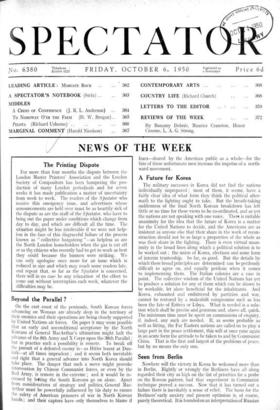A Future for Korea
The military successes in Korea did not find the nations individually unprepared ; most of them, it seems, have a fairly clear idea of what form they think the political after- math to the fighting ought to take. But the breath-taking suddenness of the final North Korean breakdown has left little or no time for these views to be co-ordinated, and as yet the nations are not speaking with one voice. There is suitable unanimity for the idea that the future of Korea is a matter for the United Nations to decide, and the Americans are as insistent as anyone else that their share in the work of recon- struction should not be so large a proportion of the whole as was their share in the fighting. There is even virtual unan- imity in the broad lines along which a political solution is to be worked out ; the union of Korea, elections and some form of interim trusteeship. So far, so good. But the details by which these broad principles are determined can be perilously difficult to agree on, and equally perilous when it comes to implementing them. The Italian colonies are a case in point. The collective wisdom of the United Nations has yet to produce a solution for any of them which can be shown to be workable, let alone beneficial for the inhabitants. And Korea, exhausted and embittered by partition and war, cannot be restored by a makeshift compromise such as has been the fate of Eritrea or Libya. What is needed is a solu- tion which shall be precise and generous and, above all, quick. The minimum time must be spent on commissions of enquiry, if, indeed, any such are needed. If, as seems probable as well as fitting, the Far Eastern nations are called on to play a large part in the peace settlement, this will at once raise again in an acute form the attitude to be taken to and by Communist China. That is the first and largest of the problems of peace, but by no means the only one.


















